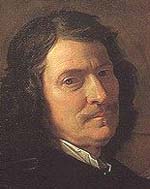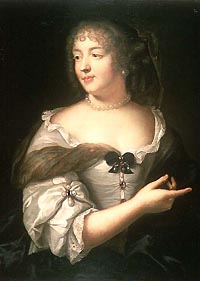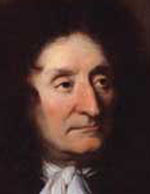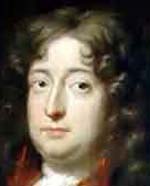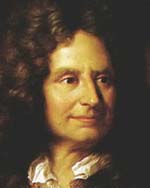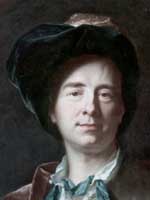Mots Français
Seventeenth CenturyRené Descartes (1596-1650)
Here is something new under the sun; something manmade. Descartes' immortal invention, analytic geometry, confers the power to convert back and forth from algebra to geometry, giving two faces from which difficult problems may be approached. Like Villon, Descartes was also concerned with ultimate questions of existence: to what undeniable minimum can life and its perplexities be reduced? We begin with doubt: what propositions survive if approached with comprehensive doubt? Here is the French version of what Descartes hoped was a fundamental and undeniable assertion (usually quoted in the parallel Latin form cogito ergo sum), from the Discours de la Méthode of 1637:Je pense, donc je suis
I think, therefore I amIt's nice, but a skeptic might argue that by the same test we could equally prove the nonexistence of a granite boulder. From the same work, a more mundane and in the end perhaps more useful thought, with a telling shift from adjective bon to adverb bien:
Ce n'est pas assez d'avoir l'esprit bon, mais le principal est de l'appliquer bien
It is not enough to have a good mind; the thing is to apply it wellThe precise way in which Descartes proposed to use the mind was from observation de novo rather than from received opinion. This passage from the Discours de la Méthode defined what would later be the Modernist position in the Quarrel of the Ancients and Moderns:
Nicolas Poussin (1594-1665)
In somewhat the same spirit of applied energy is this remark by a notable court painter of the period, one of the earliest artist-aphorists:C'est qui vaut le peine d'être fait vaut la peine d'être bien fait
What is worth the trouble of doing, is worth the trouble of doing wellArmand du Plessis, Cardinal Duc de Richelieu (1585-1642)
It is perhaps not so remarkable that the minister of Louis XIII, and the founder of the French Academy, the organizer of French political and intellectual life in his time, should have left a Testament Politique (published posthumously in 1687) whose maxims coincide at many points with hard-nosed classical Chinese statecraft theories:Être capable de se laisser servir n'est pas une des moindres qualités que puisse avoir un grand roi
To be able to have others serve him is not the least of the qualities of a great kingIl n'y a rien de si dangereux pour l'État, que ceux qui veulent gouverner les royaumes par les maximes qu'ils tirent de leurs livres
There is nothing so dangerous to the State as those who would govern the kingdom by maxims drawn from their booksMore would be heard from the theoreticians' books in the decades to come; the processes of state as well as the progresses of the stars were being subjected to rational inspection.
Louis XIV (1638-1715)
This immortal remark from the monarch's youth may have come somewhat late in the day for the view it represents, but it does encapsulate for all time the personalistic state, out of which, in the Warring States period, and later and separately in France, there evolved the bureaucratic or self-continuous state. Note the rhyme (which is made more visible by leaving off the ru-shvng consonants). The remark was made on 13 April 1655 before the Parlement de Paris, Louis being then seventeen:L'État, c'est moi
The state is myselfBlaise Pascal (1623-1662)
Pascal was an important thinker, and a significant mathematician (though second in this regard to his contemporary Fermat), and holds a place in modern French esteem as an admired stylist. His Pensées (gathered together after his death; there are 924 of them in the standard edition of Brunschvicg) are still current in the culture. Though consequential as a scientist, Pascal survives chiefly as the spokesman for something other than the power of reason in human life, and also in human history. A voice in the other direction.Le nez de Cléopatre: s'il eût été plus court, toute la face de la terre aurait changé (Pensées #162)
Cleopatra's nose: If it had been shorter, the whole face of the earth would have changedLe cœur a ses raisons, que la raison ne connaît point (Pensées #271)
The heart has its reasons, of which reason itself knows nothingThe technique of writing was of concern to Pascal, as indeed to all the master stylists:
Le dernière chose qu'on trouve en faisant un ouvrage, est de savoir celle qu'il faut mettre la première (Pensées #19)
The last thing one finds out in writing a book is what to put firstThe wit of this is in the play between "last" and "first," along with the rueful experience which even an amateur writer will share. Pensée #19 would itself suitably be placed among the last of the thoughts in Pascal's book. The editor Brunschvicg, with more logic than perception, has instead put it among the first.
François, Duc de la Rochefoucauld (1613-1680)
Books of aphorisms, partly intended for posterity, have been a major genre in France ever since Villon. The Maxims (1665) of de la Rochefoucauld, who had retired from political life in 1652, and thus was in a sense speaking posthumously, echo Richelieu in conveying, though with more verbal polish, a thoroughly Sywndzian view of the impossibility of human decency.Nous avons tous assez de force pour supporter les maux d'autrui (#19)
We all have strength enough to bear the misfortunes of other peopleL'hypocrisie est un hommage que le vice rend à la vertu (#218)
Hypocrisy is a kind of homage which vice renders to virtueMadame de Sévigné (Marie de Rabutin-Chantal, 1626-1696)
Widowed at the age of twenty-five, Madame de Sévigné devoted herself to her two children. It was in letters to her married daughter that she made most of the remarks she is still remembered for. Perhaps her most famous saying, however, and certainly her most cynical one, was actually said by another of the learned ladies of the age, namely:Madame de Cornuel (Anne-Marie Bigot, ?1614-1694)
This remark we owe to a letter, not by Madame Cornuel herself, but by a certain Mademoiselle Aïssé, writing to a friend on 13 August 1728. In it she recalled Mme de Cornuel as saying:Il n'y a point de héros pour son valet de chambre
No man is a hero to his valetOr so goes the current version. With the warning that it is not the current version, here is the original, as quoted by Mademoiselle Aïssé:
Il n'y avoit point de héros pour les valets de chambre
No men are heroes to their valets,
et point de pères de l'Église parmi ses contemporains
nor any of the Fathers of the Church, among their contemporariesNeedless to say, there are textual variants beyond these two. The overstuffed courtiers of the late 17th century are sufficiently deflated in all of them — provided we ignore the sympathy implicit in the second clause.
Jean de la Fontaine (1621-1695)
The Fables of la Fontaine (1668) add the seasoning of wit to the cynical truth that what counts in the world is power. This is the opening line from "The Wolf and the Sheep:"La raison du plus fort est toujours la meilleure
The argument of the stronger party is always the better
Jean Racine (1639-1699)
We may usefully regard the theater as a pretext, a pretext in tableau form, punctuated by thematically irrelevant dancing, for delivering lines meant to be memorable as maxims. The stage is the anteroom of the anthology. Like Rossini after Guillaume Tell, Racine retired from the stage after his crowning masterpiece Phèdre (1677). Here is an aphorism from an earlier work. It takes for granted the excellence of Swiss infantry, who since the Renaissance wars had been sought as mercenaries by other states:Point d'argent, point de Suisse (Les Plaideurs, 1668)
No money, no Swiss guardsMolière (Jean Baptiste Poquelin, 1622-1673)
Molière, coming later than Richelieu or la Rochefoucauld, takes a humorous view of the impossibility of human decency. In a hilarious scene from the extortion farce Les Fourberies de Scapin (1671), the comic servant Scapin is getting money out of his master's stingy father Géronte by pretending that the son is being held for ransom aboard a Turkish galley in the harbor. The line, as the Gallimard edition notes, is borrowed from a play by Cyrano (Rostand's play "Cyrano" takes due note of the theft). Molière's improved line is slightly shorter. It is funny in itself, and becomes unendurably so as it is repeated leitmotivically.Que diable allait-il faire dans cette galère? (Acte II, Scène VII)
What the devil was he doing on that galley?Nicolas Boileau (1636-1711)
The great critic and classicist of his age here makes a more subtle, but still at bottom amusing, distinction (from Épître X, 1698) between love of virtue and love of being associated with virtue:Ami de la vertu plutôt que vertueux
A friend of virtue, rather than virtuous in his own rightGood point, though we suspect that virtue can probably use all the friends it can get. Boileau has also left (in Épître XI) a motto for the active mind:
Le pénible fardeau de n'avoir rien à faire
The toilsome burden of having nothing to do
Bernard de Fontenelle (1657-1757)
He squared off on the opposite side of the classically inclined Boileau, in the famous Quarrel of the Ancients and Moderns, which was about the continuing place of the classics in the mind of an age which had been deeply influenced by the success of Descartes' method of doubt, and by the advance of science in general. The first salvo was fired by de Fontenelle in his 1688 Digression sur les Anciens et les Modernes:Toute la question de la prééminence entre les anciens et les modernes étant une fois bien entendue, se réduit à savoir si les arbres qui étaient autrefois dans nos campagnes étaient plus grands que ceux d'aujourd'hui
The whole question of pre-eminence, as between the ancients and the moderns, . . . reduces itself to knowing if the trees which stood long ago in our fields were taller than those of today.
25 Dec 2005 / Contact The Project / Exit to French Index Page

